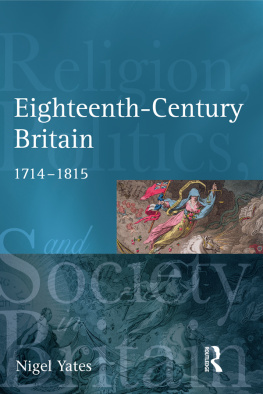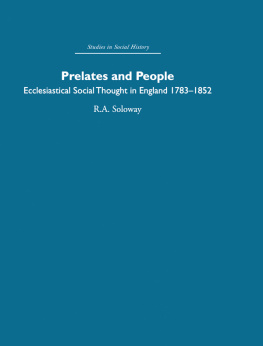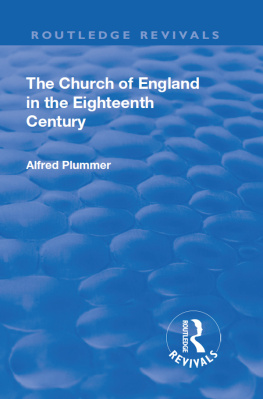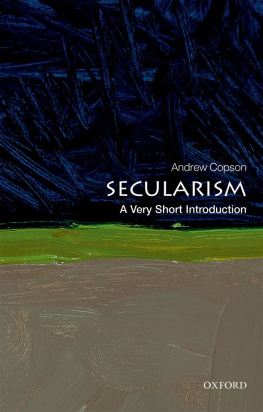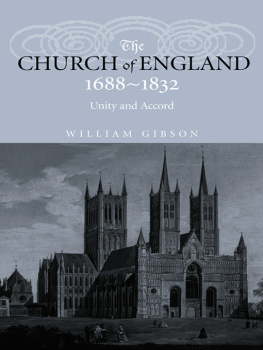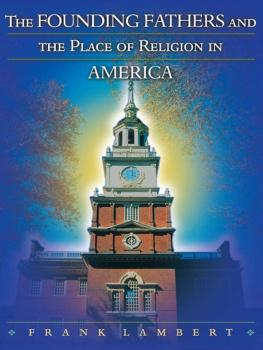Eighteenth-Century Britain
Religion, Politics and Society in Britain
Series editor: Keith Robbins
The Conversion of Britain: Religion, Politics and Society in Britain, c.600800
Barbara Yorke
The Post-Reformation: Religion, Politics and Society in Britain, 16031714
John Spurr
Eighteenth-Century Britain: Religion and Politics, 17141815
Nigel Yates
Providence and Empire: Religion, Politics and Society in Britain, 18151914
Stewart Brown
Religion and Society in Twentieth-Century Britain
Callum G. Brown
First published 2008 by Pearson Education Limited
Published 2014 by Routledge
2 Park Square, Milton Park, Abingdon, Oxon OX14 4RN
711 Third Avenue, New York, NY 10017, USA
Routledge is an imprint of the Taylor & Francis Group, an informa business
Copyright 2008, Taylor & Francis.
The right of Nigel Yates to be identified as author of this work has been asserted by him in accordance with the Copyright, Designs and Patents Act 1988.
All rights reserved. No part of this book may be reprinted or reproduced or utilised in any form or by any electronic, mechanical, or other means, now known or hereafter invented, including photocopying and recording, or in any information storage or retrieval system, without permission in writing from the publishers.
Notices
Knowledge and best practice in this field are constantly changing. As new research and experience broaden our understanding, changes in research methods, professional practices, or medical treatment may become necessary.
Practitioners and researchers must always rely on their own experience and knowledge in evaluating and using any information, methods, compounds, or experiments described herein. In using such information or methods they should be mindful of their own safety and the safety of others, including parties for whom they have a professional responsibility.
To the fullest extent of the law, neither the Publisher nor the authors, contributors, or editors, assume any liability for any injury and/or damage to persons or property as a matter of products liability, negligence or otherwise, or from any use or operation of any methods, products, instructions, or ideas contained in the material herein.
ISBN 13: 978-1-4058-0161-4 (pbk)
British Library Cataloguing-in-Publication Data
A catalogue record for this book is available from the British Library
Library of Congress Cataloging-in-Publication Data
A catalog record for this book is available from the Library of Congress
Typeset in 10/13.5pt Sabon by 35
Contents
No understanding of British history is possible without grappling with the relationship between religion, politics and society. How that should be done, however, is another matter. Historians of religion, who have frequently thought of themselves as ecclesiastical historians, have had one set of preoccupations. Political historians have had another. They have acknowledged, however, that both religion and politics can only be understood, in any given period, in a social context. This series makes the interplay between religion, politics and society its preoccupation. Even so, it does not assume that what is entailed by religion and politics remains the same throughout, to be considered as a constant in separate volumes merely because of the passage of time.
In its completed form the series will have probed the nature of these links from c .600 to the present day and offered a perspective, over such a long period, that has not before been attempted in a systematic fashion. There is, however, no straitjacket that requires individual authors to adhere to a common understanding of what such an undertaking involves. Even if there could be a general agreement about concepts, that is to say about what religion is or how politics can be identified, the social context of such categorisations is not static. The spheres notionally allocated to the one or to the other alter with circumstances. Sometimes it might appear that they cannot be separated. Sometimes it might appear that they sharply conflict. Each period under review will have its defining characteristics in this regard.
It is the Christian religion, in its manifold institutional manifestations, with which authors are overwhelmingly concerned since it is with conversion that the series begins. It ends, however, with a volume in which Christianity exists alongside other world religions but in a society frequently perceived to be secular. Yet, what de-Christianisation is taken to be depends upon what Christianisation has been taken to be. There is, therefore, a relationship between topics that are tackled in the first volume, and those considered in the last, which might at first sight seem unlikely. In between, of course are the Christian Centuries which, despite their label, are no less full of boundary disputes, both before and after the Reformation. The perspective of the series, additionally, is broadly pan-insular. The Britain of 600 is plainly not the Britain of the early twenty-first century. However, the current political structures of Britain-Ireland have arguably owed as much to religion as to politics. Christendom has been inherently ambiguous.
It would be surprising if readers, not to mention authors, understood the totality of the picture that is presented in the same way. What is common, however, is a realisation that the narrative of religion, politics and society in Britain is not a simple tale that points in a single direction but rather one of enduring and by no means exhausted complexity.
Keith Robbins, November 2005
It was a great honour to be invited by Professor Keith Robbins to contribute to this series and to find myself in such excellent company. I owe an enormous debt of gratitude to three people: to my son David, who both word-processed the final text and provided useful comment on it from the perspective of the intelligent general reader; and to my colleague Professor Peter Borsay and to one of my research students, Laura Jarvis, both of whom also read and commented on the text. They have all certainly helped to improve the book, but I must equally absolve all of them from any complicity in any defects or inaccuracies that remain.
I am dedicating this book to two former colleagues in what used to be the Kent Archives Office, and is now the Centre for Kentish Studies, who, sadly, are no longer with us. Kathleen Topping was my deputy and major support during my 12 years as County Archivist and Head of Heritage Services, and she eventually succeeded me in that post. It was an enormous shock to me, and an enormous loss to the cause of historical studies in Kent, when she died, at the obscenely early age of 50, in 2002. Our colleague, Donald Gibson, was somewhat senior to us in age, and he died later that same year though still within a relatively short period from his retirement. He was a genuine eccentric and a true scholar who tried to live the life of an eighteenth-century gentleman. Though his opinions were outrageously, and I suspect determinedly, reactionary in the twenty-first century, there was little doubt that he would have been a low church Whig in the century in which he would have preferred to have lived, whereas moderate liberals such as myself would undoubtedly have been high church Tories.
Nigel Yates
University of Wales, Lampeter
November 2005
For those with a general interest in, or understanding of, the broad outline of British history, the period between 1714 and 1815 is usually one that they have least knowledge of. It tends not to form part of the school history syllabus, nor is it particularly popular with history undergraduates at university. Films or television programmes, adapted from the literature of this period or based on the few well-known events during it, such as the madness of George III, tend to portray a society of great formality and rigid social structures which was, nevertheless, capable of a crudity and licentiousness calculated to shock all but the most unshockable. There is currently a major debate among the relatively small number of academic historians looking at this period about the true nature of British society, and the developments within it, between 1714 and 1815. At one end of the spectrum, Jonathan Clark has portrayed the period between 1688 and 1832 in the British Isles as one in which the essential characteristics of an ancien rgime mostly remained intact and, despite a degree of religious freedom unusual in most parts of Continental Europe before 1789, a confessional religious state existed.an early modern and a later modern state, and the tension that this created was to be one of the main features of its economic, political, religious and social history.

